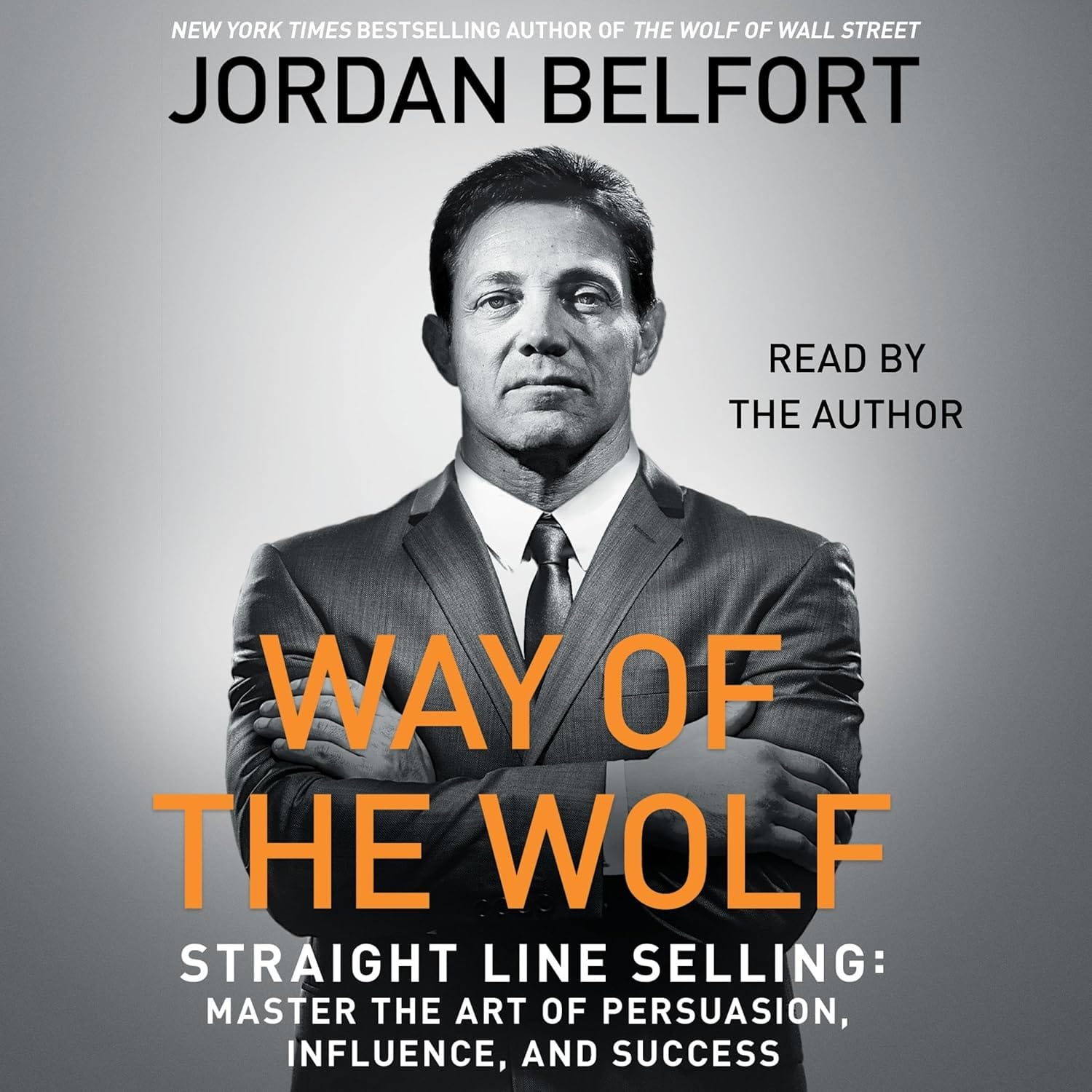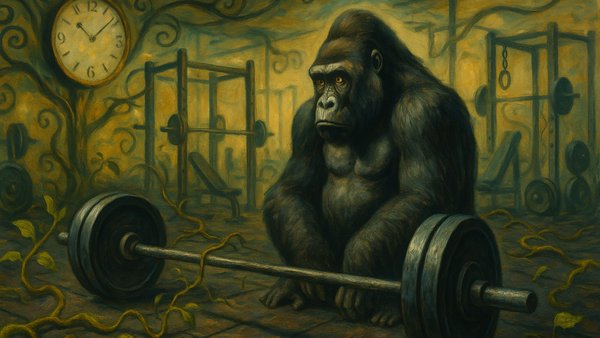The Cult of Constant Betterment
Learn how to dismantle the social-media-fueled self-improvement industry that’s quietly wrecking your sanity. This week’s issue is about marital happiness, sales strategies, and the philosophy of objectivism.

We all know all too well the endless scroll through immaculate, sunlit routines: zen-like gurus whispering about “5 AM mornings” and “cold showers,” and chefs displaying their flawless, simple, protein-loaded, gluten-free cooking routines—each post a perfect, curated slice of life. And somewhere in the back of your mind, you can’t help but think: Why can’t I do this? Why does everyone else seem to have it together while I’m here, overwhelmed and underachieving?
The All-in-One Success Myth
We watch many self-acclaimed experts, productivity maestros, fitness gods, five-star chefs, and seduction savants flex their impeccable routines: yoga, meditation, home-cooked meals, entrepreneurial hustle, vibrant social lives, merged flawlessly with a fulfilling family life. Everything looks so easy, doesn’t it?
Social media practically screams at us: you should be doing this too. And not just one thing—everything, ideally. The grind appears not just possible but almost obligatory.
Just one thing we’re seldom shown: what they’re neglecting.
Due to the relatively short human lifespan and the time required to master any substantial skill, one can become truly proficient in only one to three major areas of life. This requires picking priorities.
What you rarely see on social media is that successful people have homed in on one or two pillars—and sacrificed the rest. No one’s doing it all. The minimalist coach who outsourced his meal prep. The fitness influencer who cut ties with friends to spend hours at the gym. The work-from-home mogul who hasn’t slept a solid eight hours in a year. The pickup artist who traded family building for fleeting conquests.
On social media, we don’t engage with these personas individually. Everything flows into one endless feed, orchestrated by an algorithm that doesn’t merely serve your interests but exploits your insecurities, shortcomings, and deepest fears. It speaks to your cravings and aversions, tightening its grip on your attention.
You’re overwhelmed and beaten into submission because your mind cannot comprehend that what you’re being fed by your feed belongs to different individual lives. On top of that, each displayed life is a careful curation of only the perfected pillars people chose for their online persona. Of course, there are exceptions. But generally, what we see is:
- The crème de la crème
- of certain disciplines
- of different people’s lives.
Your mind compiles these bits and pieces into one colossal, highly stylized, utterly unattainable life concept—and measures your own existence against it. Your subconscious believes that everything you see is simultaneously attainable, and it whispers: Everyone else is doing everything. Why can’t you?
As a result, you are seduced into attempting to do everything yourself—as if one flesh-and-blood person could embody it all. After all, isn’t that what you believe you’ve seen everyone else doing?
You must realize that your time and energy are finite. Your perception of what you experience on social media is—quite literally—not real.
Stopping the Madness
Step 1: Realize Your Time Is Not Infinite
Time is a cruel mistress. You have only 24 hours. No matter how many “life hacks” you devour, this number won’t change. Audit your time. Take a blank sheet of paper and take inventory.
- What do you do?
- When and how often?
- What is every action’s output or consequence?
Assess how much of your day is spent aligned with your desired outcomes. How much is wasted on dopamine-boosting distractions like notifications, Netflix binges, mindless scrolling, or activities that sabotage your progress, like skipping meals, drinking excessive alcohol, or staying up until 2 AM texting strangers on dating apps?
Step 2: Establish Your Priorities
What matters most to you? If you think “everything,” that’s merely the lazy, passive thought that flickers up as a defense against the terror of decay and death.
From your inventory, dig out the greater objectives your activities serve. Regardless of their quality, every action serves some objective—whether consciously crafted or not.
Watching YouTube videos for an hour might be education for one person and escapism for another. Smoking might be a deliberate pleasure for one and a compulsive stress-coping mechanism for another. Working some job might be a means to earn money for one and the living of a calling for another.
Poke, prod, interrogate your list from different angles. Be precise. Resist the temptation to lie to yourself.
It’s normal to feel exhausted at this point, especially if you’ve never attempted such an exercise before. You have now reached the stage where you rank your identified objectives—and the accompanying activities—by relevance. Let’s say you have a hobby that is the most important thing to you. You want to be fit enough to maintain this hobby, but you also want to eat luxurious meals, maximize your relaxation time, and work only as much as needed to sustain this lifestyle. Your list would look something like this:
- Practicing martial arts
- Talking with friends about the hobby
- Watching shows about the hobby
- Driving to studio location of the hobby
- Cooking
- Relaxing
- Strength training
- Working
Step 3: Turn Your Priorities Into Goals
Once you have established a hierarchy among all your activities and the objectives they serve, an excellent opportunity emerges: to turn your identified objectives into proper goals. Most of our objectives are obscure and not intentionally carved out. A well-defined goal must possess certain immortal elements; otherwise, it rots into mere “hope.” These elements are clarity, specificity, measurability, achievability, time-boundedness, relevance, and emotional charge. Furthermore, it should be formulated in the present tense, phrased positively, and made as visceral and visual as possible.
- “I achieve yellow belt proficiency in Brazilian Jiu-Jitsu by May 1st, 2026, attending at least two training sessions per week without interruption.”
- “I achieve C1 fluency in spoken and written French by May 30th, 2026, completing daily immersion sessions and passing the DALF C1 exam.”
- “I maintain a daily protein intake of at least 150g and a caloric deficit of 300 calories until I reach 10% body fat by November 15th, 2025.”
- “I master 20 essential recipes (French, Mediterranean, Japanese cuisines) by December 1st, 2025, preparing one new dish every week and documenting it in a personal recipe journal.”
- “I consistently get up at 6:00 AM without snoozing for 90 consecutive days by September 1st, 2025, tracked through a daily habit journal.”
By now, you have probably realized that some of your priorities and goals are compatible with each other, while others are not. Your Jiu-Jitsu training, for instance, is compatible with maintaining a consistent sleep routine, but it competes with learning a new language or becoming a kitchen star.
Step 4: Canceling the Noise
Now, you draw a horizontal line somewhere after the three-to-five priority mark on your list and throw everything below into the trash. The tighter you cut, the more potential clarity and focus you gain—but only if this list is a true representation of your aspirations. If you put getting up at 6 a.m. high on your priorities but don’t genuinely desire it, you’re setting yourself up for failure.
Since we can’t have it all, everything not on the list must yield to the formulated priorities, and any lower priority must yield to a higher one. The self-help saints you see on social media aren’t doing everything you think they are. They’re making choices. So must you. Sacrifice is the price of excellence.
Step 5: Protecting Priorities
Once you’ve decided on your priorities, ruthlessly protect them. If reading a book each day is a non-negotiable serving a goal you genuinely wish to achieve, you must find ways to carve out the time and kill the scrolling. If cooking fresh meals is your goal, you must find ways to prevent eating out and ordering food.
What we’re doing here is creating focused habits. This should feel relatively easy at this point because you have already identified what it is you truly want. You chose your priorities—thus, everything else should now naturally feel like noise.
That being said, change usually doesn’t happen instantaneously. Ditch the fantasy that you can suddenly master everything overnight. Depending on the intensity and duration of your past conditioning, establishing new habits can take anywhere from a few days to months or even years. The only thing that matters at this point is that you return to your chosen activity, no matter how often or how far you drift. To reinforce your chosen path, review your list at regular intervals and ask yourself whether your set priorities still reflect what you want to do and achieve from a long-term perspective.
A Glimmer of Hope
Once you start cultivating a few intentional skills and habits, they will soon require less and less maintenance. This shrinking maintenance effort directly correlates with the fading need for alternative activities that obstruct your priorities. In other words, anything that poses an obstacle to your goals will soon begin to feel irritating and annoying—like sand in the gears of a machine.
The moment you reach this point, you will notice that your anxieties and the feeling of being overwhelmed by self-improvement noise from social media begin to dissolve. Your priority-primed subconscious mind will automatically filter out anything misaligned with your path, and your highest goals will naturally dictate the cultivation of lesser ones.
At present, you might be thinking, “But what about all the things I have to let go of according to this strategy?” Social gatherings, late-night Netflix binges, spontaneous meet-ups, becoming an expert poker player, doing a daily one-hour breathwork routine—these doubts will soon dissolve into utter irrelevance if you follow the steps outlined above and use your conscious mind to forge clarity about what you truly desire your life to become.
Next time you feel overwhelmed by your social media feed, there is probably some friction left. Pull out your priority list with all its goals and activities and review it item by item. You will either regain your calm and clarity, or you will find that your list requires adjustment.
In either case, you are on the right track to master the anxiety and emotional distress your social media feed is designed to instill into you. And any skill or habit, once acquired and embodied, frees up time and energy for the next conquest.
⏤Ferdinand
SUNDAY’S SPARKS
📝 ARTICLE: Does Sexual History Affect Marital Happiness?
In this piece, sociologist Nicholas Wolfinger examines the link between premarital sexual history and marital satisfaction, revealing that individuals with only one lifetime sexual partner report the highest levels of marital happiness. Drawing on data from the National Survey of Family Growth, the study finds that while women with multiple premarital partners often experience lower marital quality, the effect appears less pronounced among men. The research suggests that having numerous partners may sharpen awareness of alternatives, subtly eroding commitment and satisfaction within marriage.
[…] virgins had the lowest divorce rates, but beyond that, the relationship between sexual biography and marital stability was less clear. Having multiple partners generally doesn’t increase the odds of divorce any more than having just a few does so.
Previous research indeed suggests a complex story between premarital sex partners and marital quality. Psychologists Galena K. Rhoades and Scott M. Stanley found that the study respondents who had sex with other people prior to marriage reported lower-quality unions compared to couples who slept just with each other. Multiple sex partners prior to marriage reduced marital quality for women, but not men. Along similar lines, sociologist Jay Teachman showed that premarital sex between future spouses didn’t make divorce more likely, but sex with other people did. A study from the 1980s reported similar findings.
📚 BOOK: Way of the Wolf, Jordan Belfort
Practical guide to mastering sales and persuasion, drawn from the hard-won experiences of Jordan Belfort, the infamous “Wolf of Wall Street.” Belfort introduces his “Straight Line” system, emphasizing tonality, body language, and psychological triggers to close deals and influence people. As a former stockbroker whose meteoric rise and ruin became legend, Belfort shares raw strategies for building unshakable confidence, refining sales techniques, and becoming a commanding communicator. His story was later immortalized in a polarizing movie starring Leonardo DiCaprio.
[…] human beings don’t buy things that they think will make their lives worse; they buy things that they think will make their lives better. However, the operative word here is think. You see, just because someone has positive intent doesn’t necessarily mean that the resulting decisions will end up having a positive impact on them. In fact, with many people, it often doesn’t. Their lives are punctuated by a series of self-defeating decisions. However, even these “serial bad decision-makers” believe their decisions were good when they made them. That’s the definition of positive intent.
🎬 YouTube VIDEO: The Mike Wallace Interview with Ayn Rand
In this wonderfully mind-stimulating televised interview, originally broadcast in 1959, journalist Mike Wallace engages novelist and philosopher Ayn Rand in a piercing discussion of her philosophy of Objectivism. Rand articulates her views on rational self-interest, capitalism, and individualism, fiercely challenging prevailing societal norms. The conversation delves into her critiques of altruism and collectivism, offering deep insights into the ideological framework behind works like Atlas Shrugged. Beyond its content, the interview starkly highlights the collapse of contemporary journalism’s intellectual standards—a contrast that feels almost tragic. The whole interview is a gem; here are just a few snippets:
Rand: Self-sacrifice is the precept that men needs to serve others in order to justify his existence; that his moral duty is to serve others. That is what most people believe today. […] that men must work for others, concern himself with others, or be responsible for them. That is the role of a sacrificial object. I say that man is entitled to his own happiness and that he must achieve it himself, but that he cannot demand that others give up their lives to make him happy. And nor should he wish to sacrifice himself for the happiness of others. I hold that man should have self-esteem.
Rand: When you are asked to love everybody indiscriminately, that is to love people without any standard, to love them regardless of the fact of whether they have any value or virtue, you are asked to love nobody.
Rand: Every business has to have its own terms and its own kind of currency. And in love the currency is virtue. You love people not for what you do to for them or what they do for you. You love them for the values, the virtues which they have achieved in their own character. You don't love causelessly. You don't love everybody indiscriminately. You love only those who deserve it.
Wallace: And then if a man is weak or a woman is weak, then she is beyond, he is beyond love?
Rand: He certainly does not deserve it. He's certainly beyond, he can always correct it. Man has free will. If a man wants love, he should correct his weaknesses or his flaws and he may deserve it, but he cannot expect the unearned, neither in love nor in money, neither in matter nor spirit.
Wallace: You have lived in our world and you realize, recognize the fallibility of human beings. There are very few of us then in this world, by your standards, who are worthy of love.
Rand: Unfortunately, yes, very few. But it is open to everybody to make themselves worthy of it, and that is all that my morality offers them.
Wallace: How do you feel about the political trends of the United States, the Western world?
Rand: The way everybody feels except more consciously. I feel that it is terrible that you see destruction all around you and that you are moving toward disaster until and unless all those welfare state conceptions have been reversed and rejected. It is precisely these trends which are bringing the world to disaster because we are now moving towards complete collectivism or socialism; a system under which everybody is enslaved to everybody, and we are moving that way only because of our altruistic morality.
SUNDAY’S WISDOM
A little learning is a dangerous thing;
Drink deep, or taste not the Pierian spring:
There shallow draughts intoxicate the brain,
And drinking largely sobers us again.
From An Essay on Criticism
by ALEXANDER POPE
Captured with the powerful Kindle reader.
Did this issue spark something in you?
Fuel Sunday Sparks’ independence.
Flows straight into content, not coffee.





